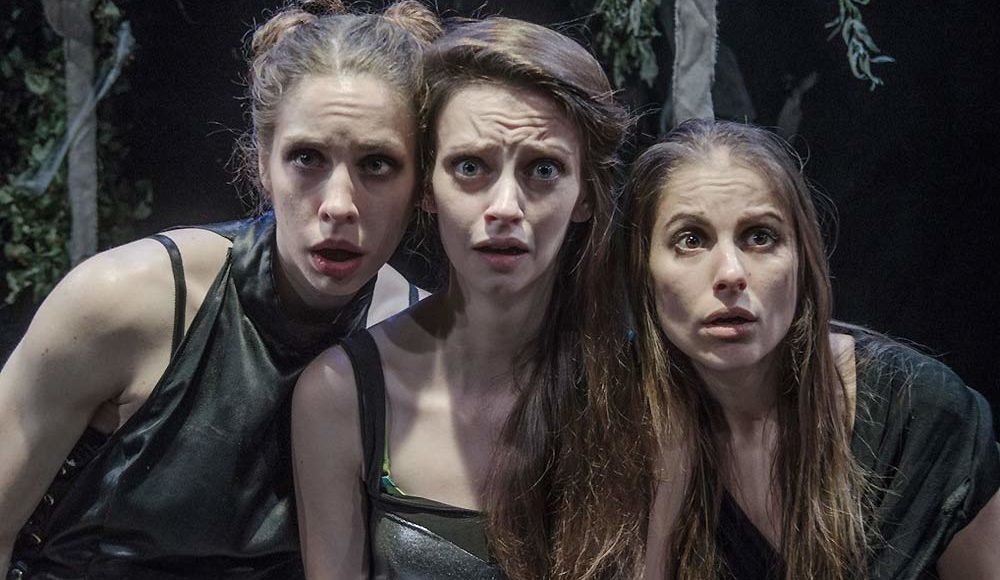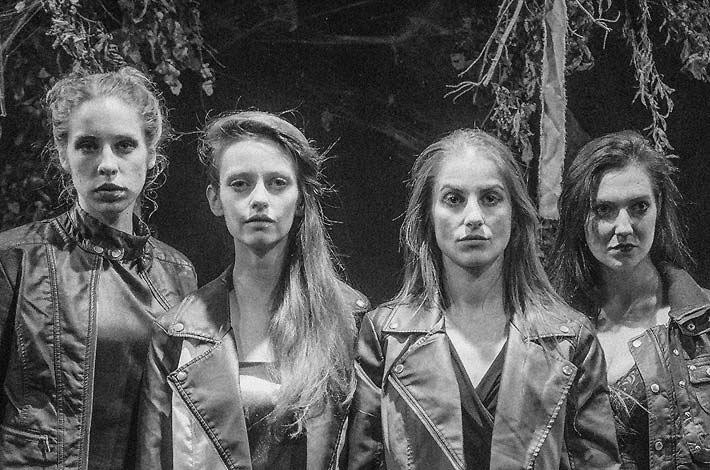Meg Miroshnik’s The Fairytale Lives of Russian Girls is a frequently poetic, consistently absorbing mishmash of Paglia’s pronouncements, Bettelheim’s theories and a cascade of feminist icons and archetypes ranging from Cinderella to “Pussy Riot.”
Her credentials are solid enough: O’Neill National Playwrights Conference, finalist for the Blackburn prize and an MFA in playwriting from the Yale School of Drama.
Yet all that does not guarantee a cohesive narrative, which is evident from the staging at Chicago’s much touted Trap Door Theatre.
The problem is certainly not with Nicole Wiesner’s “Damn the torpedoes” direction. She boldly grabs the bull by the horns here, as well as the four legs, tails and other hinder parts, and the selection of this work, despite its shortcomings, strikes one as reflective of the venue itself.
All but concealed to the casual passerby on Cortland Avenue, the entrance to the theatre befits its name, with a long narrow corridor straitjacketed between two buildings, like a setting plucked from a Poe tale of terror, providing entry.
As one saunters to their seat, a tableau of three scantily clad “Harlots with the hearts of razor blades” sets the tone of the evening with baleful moans and muttered stark statistics:
“1 in 6 women have been sexually assaulted in the U.S.”
“Only 2% of women describe themselves as beautiful.”
Blurring the lines between classic Russian fairy tales which out grim the Grimm’s in their bleakness and the dilemmas faced by Russian women today as that country lurches between Soviet decay and the new oligarchy’s hoodlumism, Miroshnik, in the time-honored tradition of all fairy tales, plunges her heroine into the dangers of the dark forbidding forest.
Here however our Little Red Riding Hood is a bored Jewish Princess from Southern California and the woods are in the suburbs of Moscow.
Annie (Emily Nichelson) has been forced back to the Old Country by her mother to live with her trollish Babushka (Marzena Bukowska) while attending the local college to improve her Russian. There she quickly falls into the company of two local devochka party girls, Masha (Simina Contras) and Katya (Halie Ecker).
Miroshnik ripples the story lines of our three heroines, shifting and counter pointing the threats they face from the diversities of a flesh consuming ogress, evil stepmother, abusive sugar daddy and drunken boy friend who may be a bear.
Unfocused hodge-podge though it is, the play is not without nuggets of dramatic dynamism or raw and concupiscent poetry, both of which Wiesner and her cast buff to a brilliant burnish. Miroshnik also manages, I find, to shove her message to the forefront of the twirling unrefined maelstrom of her piece. A message which seems to state that women must create a control of their own devising if they seek security from the societal beast of entrenched gender despotism which seeks to diminish them, exploit them and finally devour them.
Our three heroines, in a land far, far away, where we are told, a woman is a “girl until she turns 70,” succeed in achieving wisdom thru the adversity they face. Here is a standard motif found in all “fairy tales” throughout our species’ history, stretching in an unbroken chain from the epic of Gilgamesh, the tales of the Gospels * down to Chapter VI of the Star Wars Saga; and all serving the same purpose: to explain in the guise of a simple story life’s great truths.
Our heroines learn that no Never-Never Land, whether of the folkloric variety or one offering the shops of Rodeo Drive will assure they’re safely out of the deep, dark forest of life unless they first take up the woodsman’s ax and begin themselves the task of chopping those gnarled and menacing oaks impeding the pathway out; and that it is only in supporting the empowerment of each other that they may win for themselves, if not a “happily ever after” at least a “happily ever after for now.“
Of special interest in this play, which is nothing if not interesting, is that there are no men in its cast. A fact that may appear to argue—by the lack of their presence—that the exploitation of women, at least in our present period, is an unattainable condition unless “male dominance” is allied with feminine’s subservience.
For tyro feminists to rigidly maintain there is no monster lurking in equality’s bedroom closet than a swaggering bogeyman who reeks of testosterone betrays a naivety that can be easily dispelled by a quick reading of Jenna Jenison’s biography or a viewing of any of the offerings found in the Girls Gone Wild series.
Miroshnik may be hinting that the objectification of women is a seed planted by man, but one that only flourishes if a woman allows soil for its roots; it seems so when one of her characters coos enviously of a friend who’s the mistress of a wealthy oligarch – “I could come just thinking about the hand bags he gives her.”
Whatever its shortcomings, buried within The Fairytale Lives of Russian Girls are many gems for the finding, and with her wonderfully talented cast – Meghan Lewis, Ann Sonneville and the aforementioned Nichelson, Bukowska, Contras and Ecker, Wiesner digs deeply for each and every one.
The finest jewel they unearthed is a commentary refuting that piece of archetypal misadvise always foisted on those at the outset of their odyssey about holding to the path. It arrives on stage as the epiphany of one of Miroshnik’s heroines and quickly receives the truest of confirmations from another:
“You can’t stick to the path!”
“Not if you want to get anything done.”
Here is the knowledge that enables Luke Skywalker to destroy the Deathstar with his “targeting computer” deactivated; the knowledge that allows the Prince of Peace to put aside Jewish fables, endless genealogies and commandments of men (Titus 1:14 & 1 Timothy 1:4-7), and replace Old Testament law with New Testament love;and this knowledge allows Miroshnik’s princess to overcome the dark forest and all its dangers and return to her beautiful kingdom by the sun soaked beaches just south of Malibu.
From the audacity and artistry permeating this staging, it is apparent that the Trap Door Theatre knows better than to stick to the path or keep within the lines.
A lesson we should all take to heart.
(Sorry to be the one who has to break the news to you, but there are no unicorns, Santa Claus was invented as a marketing ploy and yes, all religions are fairy tales. Just deal with it.)
♦ ♦ ♦
The Fairytale Lives of Russian Girls
Written by Meg Miroshnik
Directed by Nicole Wiesner
Cast: Marzena Bukowska, Simina Contras, Halie Ecker, Meghan Lewis, Emily Nichelson and Ann Sonneville
Where: The Trap Door Theatre, 1655 W Cortland Ave, Chicago, IL 60622
When: October 15 – November 21
For Tickets: www.trapdoortheatre.com






